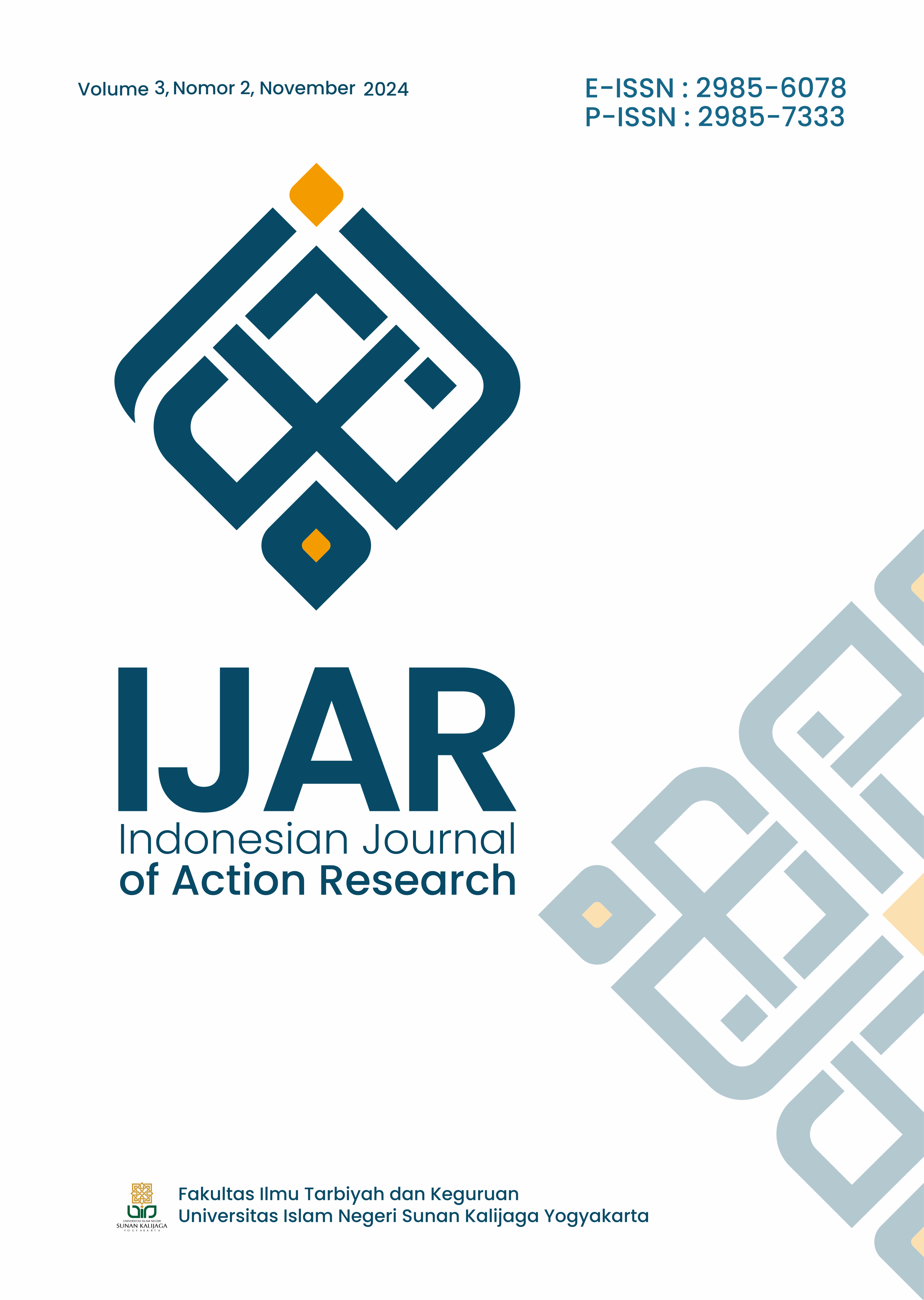Peningkatan Hasil Belajar Bahasa Inggris melalui Model Project-Based Learning: Studi Tindakan pada Siswa Kelas XI MAN 1 Yogyakarta
Main Article Content
Abstract
Tujuan – Penelitian tindakan kelas ini bertujuan untuk mendeskripsikan peningkatan hasil belajar Bahasa Inggris siswa kelas XI MIPA 1 MAN 1 Yogyakarta melalui penerapan model pembelajaran Project-Based Learning (PBL).
Metode – Penelitian dilakukan selama semester genap tahun ajaran 2022/2023 dalam dua siklus. Tahapan dalam setiap siklus meliputi perencanaan, pelaksanaan tindakan, observasi, dan refleksi. Data dikumpulkan melalui observasi, wawancara, dan dokumentasi, serta dianalisis secara deskriptif kuantitatif.
Hasil – Hasil penelitian menunjukkan bahwa penerapan PBL mampu meningkatkan partisipasi aktif siswa, motivasi belajar, serta hasil belajar Bahasa Inggris. Ketuntasan belajar siswa meningkat dari 32,14% pada pra-siklus menjadi 78,57% pada siklus I, dan mencapai 100% pada siklus II. Peningkatan ini mencerminkan efektivitas PBL dalam menciptakan suasana belajar yang kolaboratif dan bermakna. Model ini memberikan ruang bagi siswa untuk berkreasi, berpikir kritis, dan bekerja dalam tim sehingga mendorong keterlibatan mereka secara aktif dalam proses pembelajaran. Temuan ini memberikan implikasi positif bagi pengembangan strategi pembelajaran Bahasa Inggris yang lebih inovatif dan sesuai dengan tuntutan kurikulum berbasis kompetensi. Keterbatasan penelitian ini terletak pada cakupan subjek yang terbatas pada satu kelas di satu sekolah, sehingga generalisasi hasil perlu dilakukan secara hati-hati.
Downloads
Article Details
References
Afifi, S., Santoso, H. B., & Hasani, L. M. (2022). Investigating Students’ Online Self-Regulated Learning Skills and Their E-Learning Experience in a Prophetic Communication Course. Ingénierie des Systèmes d’Information, 27(3), 387–397. https://doi.org/10.18280/isi.270304
Aldobekhi, S. A., & Abahussain, M. O. (2024). Enhancing English Language Students Productive Skills through Project-based Learning: A Mixed Method Research. International Journal of Learning, Teaching and Educational Research, 23(1), 231–257. https://doi.org/10.26803/ijlter.23.1.12
Aley, M., Lee, R., Wang, J., Wang, J., & Zheng, S. (2024). Project-based Learning and Student Outcomes in Health Professions Education: A Literature Review. Health Professions Education, 10(3), 233–241. https://doi.org/10.55890/2452-3011.1292
Attaviriyanupap, K. (2025). Bridging Borders with a Project-based Approach to Enhance Bidirectional Cultural Awareness in Foreign Language Teaching and Learning. LEARN Journal: Language Education and Acquisition Research Network, 18(1), 552–567. https://doi.org/10.70730/TKDN1569
Beckett, G. H., Beck, J., Lestari, F., Yang, J., & Jean Lim, H. (2025). Qualitative research synthesis of project-based (language) learning and teaching in East and Southeast Asia: 2002–24. Language Teaching Research. https://doi.org/10.1177/13621688251313745
Boardman, A. G., & and Hovland, J. B. (2024). Student perceptions of project-based learning in inclusive high school language arts. International Journal of Inclusive Education, 28(10), 2235–2250. https://doi.org/10.1080/13603116.2022.2091170
Boardman, A. G., Polman, J. L., Scornavacco, K., Potvin, A. S., Garcia, A., Dalton, B., Stamatis, K., Guggenheim, A., & Alzen, J. L. (2024). Examining Enactments of Project-based Learning in Secondary English Language Arts. AERA Open, 10. https://doi.org/10.1177/23328584241269829
Chao, C., Abdul Rahman, N. A., & Soon, G. Y. (2025). A Review on Project Based Learning in Enhancing English Writing Skills. Forum for Linguistic Studies, 7(1), 913–926. https://doi.org/10.30564/fls.v7i1.8106
Durriyah, T. L., & Zuhdi, M. (2018). Digital Literacy with EFL Student Teachers: Exploring Indonesian Student Teachers’ Initial Perception about Integrating Digital Technologies into a Teaching Unit. International Journal of Education and Literacy Studies, 6(3), 53–60.
Guerra-Macías, Y., & Tobón, S. (2025). Development of transversal skills in higher education programs in conjunction with online learning: relationship between learning strategies, project-based pedagogical practices, e-learning platforms, and academic performance. Heliyon, 11(2). https://doi.org/10.1016/j.heliyon.2024.e41099
Hao, L., Tian, K., Mohd Salleh, U. K., Chin, H. L., Ge, S., & Cheng, X. (2024). The Effect of Project-Based Learning and Project-Based Flipped Classroom on Critical Thinking and Creativity for Business English Course at Higher Vocational Colleges. Malaysian Journal of Learning and Instruction, 21(1), 159–190. https://doi.org/10.32890/mjli2024.21.1.6
Hoesny, M. U., Setyosari, P., Praherdhiono, H., & Suryati, N. (2024). Integrating Digital Technology into Project-Based Learning: Its Impact on Speaking Performance. Mextesol Journal, 48(3), 1–11. https://doi.org/10.61871/mj.v48n3-4
John, A., & Anna D. Levshits. (2024). Enhancing Language and Linguistic Proficiency Through Project-Based Learning: A Study from South India. Forum for Linguistic Studies, 6(5), 326–335. https://doi.org/10.30564/fls.v6i5.7141
Rochimah, H., Japar, M., & Solihatin, E. (2025). Systematic Literature Review: The Effectiveness of Technology-Assisted Project-Based English Language Learning. Participatory Educational Research, 12(1), 195–221. https://doi.org/10.17275/per.25.11.12.1
Shi, J., Sitthiworachart, J., & Hong, J.-C. (2024). Supporting project-based learning for students’ oral English skill and engagement with immersive virtual reality. Education and Information Technologies, 29(11), 14127–14150. https://doi.org/10.1007/s10639-023-12433-w
Song, X., Razali, A. B., Sulaiman, T., & Jeyaraj, J. J. (2025). Effectiveness of online project-based learning on Chinese EFL learners’ critical thinking skills and reading comprehension ability. Thinking Skills and Creativity, 56, 101778. https://doi.org/10.1016/j.tsc.2025.101778
Suryani, N. Y., Rizal, S., Rohani, T., & Ratnaningsih, H. (2024). Improving Learners’ English Writing Skills Through Digital Technology and Project-Based Learning. Jurnal Ilmiah Ilmu Terapan Universitas Jambi, 8(1), 21–34. https://doi.org/10.22437/jiituj.v8i1.32506
Tahir, S. Z. Bin. (2017). Multilingual teaching and learning at Pesantren Schools in Indonesia. Asian EFL Journal, 98, 74–94.
Tanaka, M. (2025). Impact of group work environment and size on L2 motivation in project-based learning. System, 130, 103621. https://doi.org/10.1016/j.system.2025.103621
Tran, D. T. (2025). Students’ perceptions towards project-based learning: A Vietnamese case study. Multidisciplinary Science Journal, 7(2), 1–14. https://doi.org/10.31893/multiscience.2025090
Tristiana, N. E., Hartono, R., Faridi, A., & Fitriati, S. W. (2024). ICT-based Classroom Instruction Design: Exploring EFL Pre-Service Teachers’ Perception of Project-Based Learning Strategy for Developing Pedagogical Competence. Teaching English Language, 18(2), 347–378. https://doi.org/10.22132/tel.2024.459941.1620
Tu, H. L. (2024). The impact of project-based learning and local cultural content on EFL learners’ speaking proficiency. Journal of Infrastructure, Policy and Development, 8(13), 1–11. https://doi.org/10.24294/jipd9750

